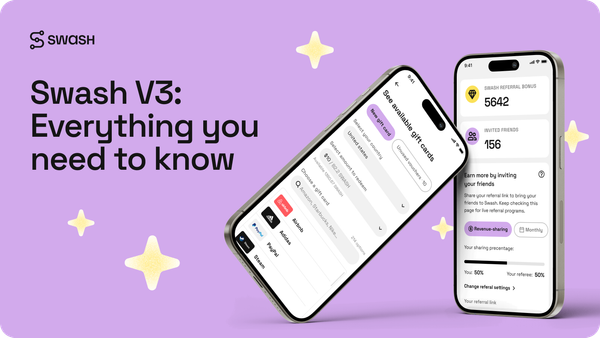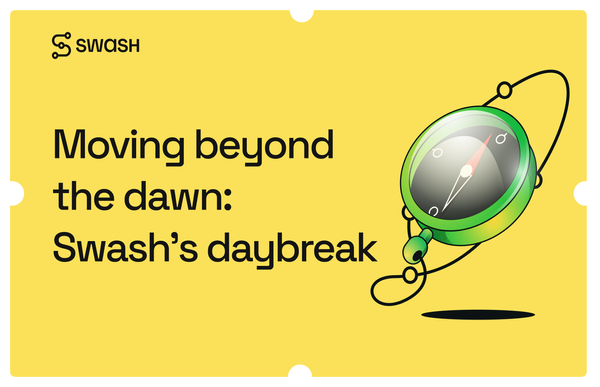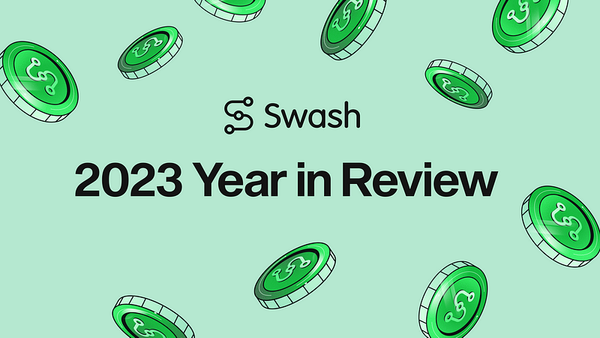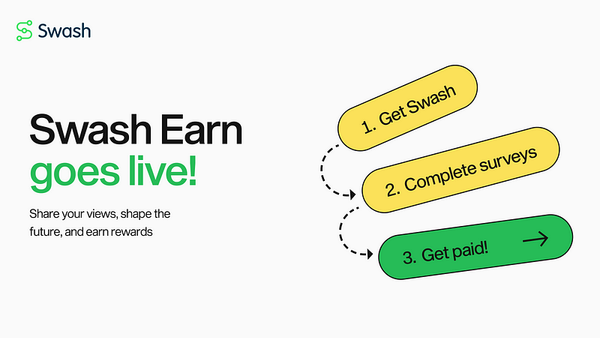The Dawn of a New Age of Data
Revealing Swash’s new tokenised ecosystem for empowering everyday internet users and unlocking the next generation of Web 3 innovators.
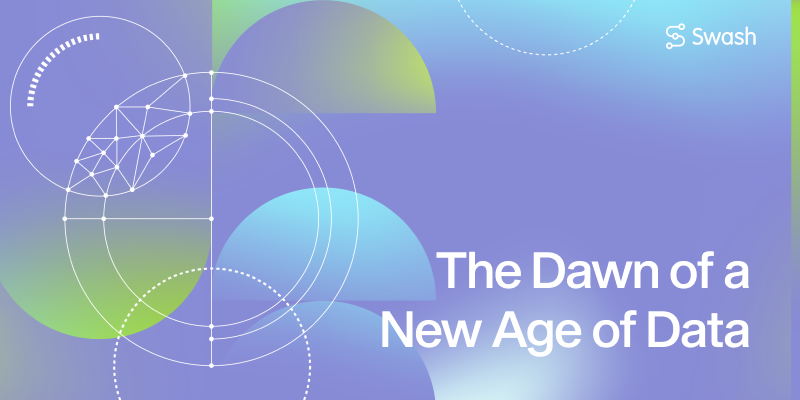
Revealing Swash’s new tokenised ecosystem for empowering everyday internet users and unlocking the next generation of Web 3 innovators.
The upcoming launch of the new Swash ecosystem will enable key stakeholders to work together by providing novel incentivisation mechanisms that cater to the needs of everyone involved. This article is centred on introducing you to the Swash universe, the First Wave Solutions to be built and launched on Swash tech, and the value driver behind it all: the Swash token.
TL;DR:
- Swash, the world’s first and most successful Data Union, is expanding into an all-inclusive data ecosystem
- System stakeholders — individuals, businesses, and developers — will be incentivised by new tools and monetisation mechanisms to encourage their involvement
- The first wave solutions to be built on top of Swash core technology include Data Union, sIntelligence, sApps, and sCompute
- The Swash ecosystem is powered by Swash’s own native currency, the Swash token (SWASH)
The rest of this article explores each point in more depth, while more materials — including the whitepaper and an archive of media features — can be found on our website.

Swash is a movement for reimagining data ownership.
Swash’s all-inclusive data ecosystem will enable true collaboration while unlocking unique value systems through innovative monetisation mechanisms. The communities contributing to this system are driven by the belief that people should be appreciated for the data they generate and are driven by the desire to be part of a future information economy that works in the interests of everyone without compromising on transparency, privacy, or individual agency.
Realities of a world dominated by data
There is an immense opportunity here for everyone involved, starting with every single internet user. Data is valuable and its worth is only set to increase, with the European Commission currently pegging the data economy at a staggering $3 trillion dollars.
And this is only the beginning.
With increasing digitisation and the prevalence of embedded devices, every individual creates an estimated 1.7MB of data every second, with the global datasphere expected to grow to 175 zettabytes by 2025. With these figures in mind, it’s crucial that people are recognised for their integral role within this burgeoning economy.
People are already waking up to this and demanding better standards. An estimated 81 percent of adults feel like they lack control over their data as they become more aware of its influence in their lives. Scandals like Cambridge Analytica-Facebook, increasing regulations like GDPR and CCPA, and the impending demise of third-party cookies are the driving force behind this movement.
We’re at the point where the impact of data on society is clear, especially when Big Tech companies like Facebook and Google — whose business models revolve around their ability to collect hoards of user information and use it for advertising — are the most valuable companies on the planet. Whether through benign advertising or its application in political campaigns or misinformation around COVID-19 health data, we are in desperate need of alternative solutions that provide robust systems built on transparency and fairness, rather than supporting those that exacerbate existing issues with little motivation to do better.
Reaching breaking point
If we don’t do something about the data dilemma, the world is at risk. In the information age, you are your data.
We’ve reached a point where data defines every aspect of our lives, yet people don’t have any ownership over their personal information. They’re unable to control what happens to it; how it’s collected, used, and sold, and don’t receive any of the value it generates. Without the right technical skills, they can’t regain control or receive their fair share for their contributions, leaving everyday internet users at the mercy of monopolies with no way out.
If any business wants to survive in this climate, they need insights. But with massive data silos held by monolithic institutions, the data they’re left with is expensive, low-quality, and collected without user knowledge or consent. If they don’t want to make the situation worse, they’re left with few alternatives.
The people who could build those alternatives have their own problems. Those same data silos make accessing large amounts of high-quality data difficult, stifling innovation and leading to issues like discrimination and bias in AI.
Meanwhile, tech entrepreneurs have to build without any clean and easy way to communicate with their users or to reward them for their participation, exacerbating the skewed power dynamic between online platforms and the people they serve. Noone, except stakeholders in big tech companies, benefits from the current status quo.
Time for a new dawn
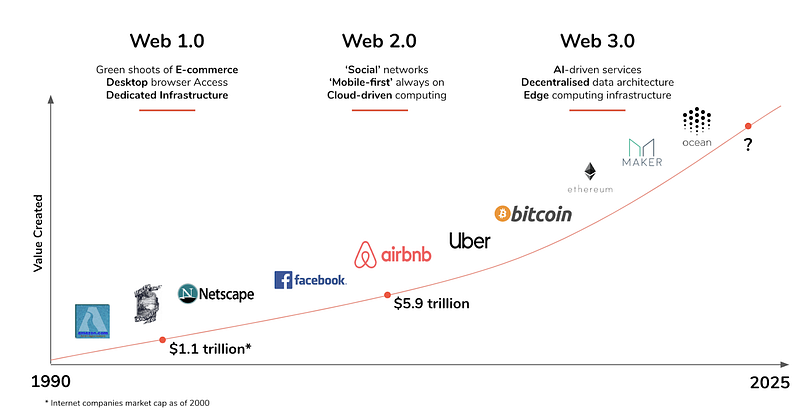
As we enter a new decade, a paradigm shift is unfolding in the realm of data. Sparked by the world of Web 3, we’re witnessing a movement towards more collaborative, sustainable, and transparent systems that work in the interest of the majority.
The alignment of sentiment, legislation, and decentralisation provides a unique opportunity to open up the world of data ownership to the masses, giving people a say in what happens with fair compensation for their efforts.
This couldn’t be more urgent. Data aside, the world has never seen more extreme income disparity. If profits made from data sales were shared between the people who created it in the first place, what could our world look like?
This is where Swash comes in.
Swash was born as a solution to these problems, driven by the urgent need to reform the current way we do data. Instead of a system that bleeds agency from individuals, we’re replacing it with one where people can reclaim their data dignity, businesses can thrive, and developers can innovate with ease.
Expanding from the successes and learnings of the Swash browser application, the enhanced Swash ecosystem will bring individuals, businesses, and developers together through revolutionary incentivisation mechanisms that work to the needs of everyone. Unique tools and innovations will make it possible for all actors to cultivate fresh realities of data ownership and value creation.
“Swash is a key component of how we mainstream a new data economy, whether we call it an open data economy or something else. We need these cornerstones that allow for the average person to be able to take back control of their data and then to turn that data into a commodity. This has the potential to become a form of Universal Basic Income.”
- Jamie Burke, Founder of Outlier Ventures
Inevitable change, unstoppable movement
With the success of Swash so far and its position as the world’s first Data Union, it was only a matter of time before it would emerge from the shallows and evolve into a universal data ecosystem.

This expansion will bring Swash even closer to its vision of redefining how data is collected and valued to balance power dynamics and to make more of what already is, providing an easy way to passively earn and innovate, creating a fairer world and better, more equitable internet.
Since its inception in 2019, Swash has grown into one of the largest, most robust applications in the blockchain space, growing from 5000 to 90,000 members within mere months. This momentum hasn’t gone unnoticed, with Swash featured as a prime example of a ‘ bottom-up’ data institution by the Open Data Institute (ODI) and featured in pioneering research by the Mozilla Foundation that determined the need for “killer apps” if we want to create sustainable Data Futures. The success and adoption of Swash has also launched Data Unions into the mainstream, attracting attention from the likes of MIT, the Financial Times, and the EU Data Governance Act.
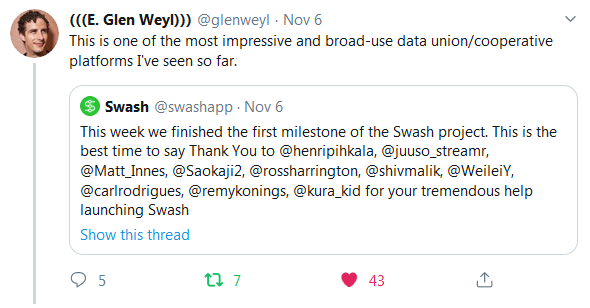
This success has only been possible with the support of the Swash community and our vast constellation of partners and collaborators. Working with some of the best minds in the blockchain space, including Streamr, Ocean Protocol, KuCoin, Chainlink, Outlier Ventures, and Boson Protocol, redefining standards around data privacy as a founding member of the DPPA, and partners with the WEDF, and MyData Online, and getting featured by the likes of Harvard Business Review, Forbes, Cointelegraph, CoinDesk, and GirlGoneCrypto, has positioned Swash as a leading example of what happens when you combine technology with people power at the forefront of the decentralised data industry.
It is clear to us how important it was to continue expanding Swash into a fully collaborative and efficient value chain as we enter the next stage of the information epoch. We want to provide practical solutions for Swash stakeholders by working towards a truly symbiotic system that’s driven by the ethos of Web 3.
Today, we are pleased to introduce you to the next evolution of Swash; an overview of the ecosystem and the principles behind it, the first generation of solutions built on Swash core technology, and the driving force behind it all: the Swash token.

A peek at the Swash ecosystem
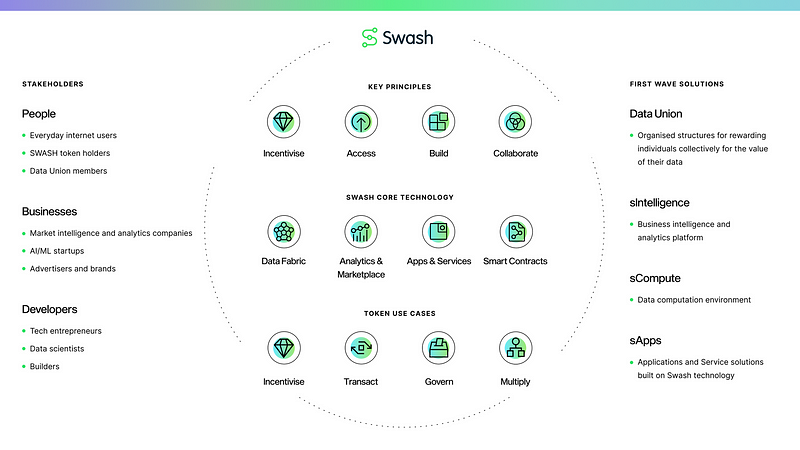
Envisioning the future: Key principles
To make this work, Swash must be able to reach all corners of the information economy. This is complicated and uncharted territory, so we’re distilling the driving force behind the movement into four key principles to address the immediate concerns of each stakeholder and to offer the right incentives for them to get involved in a sustainable, scalable way.
The following four principles will be used to underpin all design, development, and innovation within Swash, keeping everyone engaged and the Swash community active:
- Incentivise: Provide a way for users to get paid for the value of their data and to encourage more people to join the community
- Access: Improve access to high-quality, zero-party data for businesses and data scientists
- Build: Encourage developers and entrepreneurs to join a new generation of data solutions
- Collaborate: Work alongside ecosystem partners to allow for interoperability and mass adoption at scale towards a wider vision for the future of data
Additionally, these principles help to make sure that everyone; including individuals, developers, businesses, partners, community, and innovators, are motivated by the same vision and stay aligned as Swash grows.
Take-off: Launching Swash First Wave Solutions
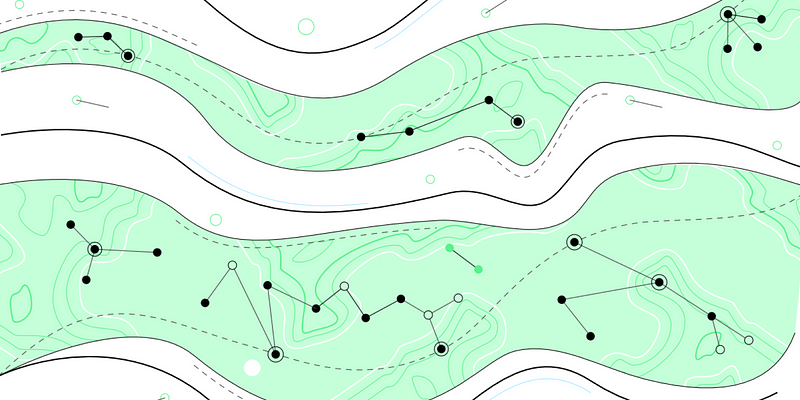
With the launch of the Swash ecosystem comes the birth of the First Wave Solutions. These solutions — united by Swash key principles — will seek to ignite curiosity and spark innovation among the community.
The first breed of solutions, outlined below, are just the tip of the iceberg. As Swash grows and relationships expand, the solutions and apps built onto Swash technology will give rise to a powerful community of collaborators.
Each solution is explored in-depth in the whitepaper, which will be released soon. Until then, here’s a taster:
Data Union: Optimising individual agency as a collective force by rewarding union members for the value of their data
The Data Union works to manage and protect the interests of its members. As a result, those members have greater power and control over how their data is collected, accessed, and used while receiving a portion of the profits generated.
By rewarding people for the value of their data, people can earn for activities they already do online — like surfing the web — enabling individuals to practice their data rights while celebrating their role as essential value providers in a thriving network.
sIntelligence: Bringing unique insights to businesses across all industries through a customisable, comprehensive web-based platform
Businesses need insights about their industry, market, and rivals to stay informed and get ahead of their competition. However, the current Competitive and Market Intelligence (CMI) landscape is broken — it’s dominated by a few key players who are increasingly susceptible to regulatory pressure, sentiment around data rights, and the need for sustainable data collection and usage.
sIntelligence provides unique, unrivalled business intelligence in an easy-to-use, customisable platform, providing businesses with everything they need to get a competitive advantage in their sector. It will use aggregated Swash data to show companies their key metrics via a web-based platform.
sApps: Expanding the Swash ecosystem with the tools, community, and culture for building the next era of data solutions
If Web 2 has taught us anything, it’s that the biggest companies in the coming decade will be those that know what to do with data. Developers who want to be a part of the next generation of data solutions can hit the ground running by tapping into the Swash network and building their own applications on Swash technology (sApps).
sApps will have many uses and can come in a variety of forms but are aligned by the ability to redistribute rewards and other compensation back to users of sApps. sApps will also make it possible to communicate directly with users to get to know them better and provide another value stream, such as by viewing ads or answering questions or polls.
sCompute: Uniting innovation with access by making on-site data computation capabilities a reality
Data Scientists struggle to innovate due to a lack of access to data. If large amounts of diverse, reliable data is available, then Artificial Intelligence models will become more accurate and less biased. In practice, it’s difficult to find and access large amounts of data due to the risks associated with sharing and storing it.
With sCompute, Swash makes it possible for data scientists to perform computations on data without needing to purchase it. The data itself remains private and isn’t sold or moved. Instead, they can deploy their algorithms on Swash data and pay only for the computation and to access the results. The results and products built from this computation can also be resold to generate value for both data scientists and the data contributors whose data was included in the dataset.
“We can’t wait to take this to the next level and bring even more value to more people. Swash is unique in that it operates on a better-than-free model, which is why we’ve decided to run with incentivisation mechanisms and the idea of bringing an abundance of value. We want to take what we’ve learned so far and catapult it into a whole new dimension. What we’re doing is changing the way we look at data.”
- Reza Naeeni, Swash
The Swash token — Powering a world of data
The Swash value chain is powered by its native token (SWASH). SWASH has a variety of use cases within the ecosystem and is used as a cross-chain utility and governance token integrating Ethereum, Gnosis Chain, Polygon, and Binance Smart Chain. It is also fused with our constellation of partners and their native currencies, allowing for cross-fertilisation of value, increased adoption, and a seamless user experience.
Now theSwash expansion is live, use cases for the Swash token include:
- Incentivise: As an incentive system, ecosystem actors are rewarded with Swash tokens in return for their participation.
- Transact: All data transactions across all marketplaces, platforms, and applications are distributed in SWASH. This includes value generated within the business intelligence and analytics platform (sIntelligence), the data computation environment (sCompute), and solutions developed utilising Swash technology (sApps).
- Govern: Swash token holders can vote for projects they wish to see receive funding from the Swash DAO fund, decide on new roadmap developments or modifications, and to take part in token-related decisions.
- Multiply: People can individually and collectively contribute the value of their data to social development causes and use it for value exchange both within and outside the Swash universe, such as redeeming earnings for products.
Conclusion
The current data economy has struggled with monopolised structures, lack of transparency, and stifled innovation for decades, but it doesn’t have to be like this. Swash has already proven that other structures are not only possible; they’re already happening through its success as the world’s first and largest digital Data Union.
Swash is a movement for unlocking new ways of doing data. As a known leader in the realm of decentralised data and the bridge towards mainstream adoption, Swash is now carving out a reality that recognises the value of every actor while incubating and giving rise to the next genesis of information-adjacent solutions.
Swash enables internet users, developers, and businesses to cultivate alternative systems of data ownership and value creation.
For internet users:
- Regain ownership and receive passive income as they surf the web
- Collectively invest value of data into social development
- Exchange data value for alternative ecosystem benefits
For businesses:
- Access high-quality, zero-party data at scale
- Save time and money by eliminating intermediaries and reducing ad fraud and bots
- Improve the reputation and sustainability of business practices
For developers:
- Accelerate innovation due to improved access to diverse data
- Be part of a new generation of data solutions
- User acquisition through incentivisation mechanics and communication
Follow the Swash blog or join the mailing list for the latest project updates and announcements.
About Swash
Know your worth and earn for being you, online.
Swash is an online earning portal where you can earn up to $200 per month for being active and completing tasks online. Whether you’re surfing the web, seeing ads, or sharing opinions, you deserve to be thanked for your efforts.
New ways to amp up your earnings are added to Swash every month!
Alongside the Swash earning dashboard, Swash consists of a wide network of interlinking collaborators including:
- brands that publish ads with Swash Ads
- businesses that buy and analyse data with sIntelligence
- data scientists who build models with sCompute
- developers who innovate on the Swash stack
- charities who receive your donations with Data for Good
Swash has completed a Data Protection Impact Assessment with the Information Commissioner’s Office in the UK and is an accredited member of the Data & Marketing Association.
Let’s connect:
Curious to learn more? Check out these links:
📚 Read:
- Harvard Business Review: Why It’s So Hard for Users to Control Their Data
- Forbes: How Decentralization Could Alleviate Data Biases In Artificial Intelligence
- CoinDesk: Data Is Labor: Why We Need Data Unions
- CoinDesk: Data Ownership Should Be About Software, Not Lawsuits
- Hackernoon: 5 Web3 Startups That Deserve Your Attention
- Mozilla Foundation: What Helps? | Understanding Needs and the Ecosystem for Support
- Open Data Institute (ODI): What are ‘bottom-up’ data institutions and how do they empower people?
- Financial Times: Joe Biden and the ‘great rebalancing’ of the US economy
- MIT: MIT Media Lab’s Pentland: Toward New Economic Models Using Data Unions
- DDI: Time to take back control of our data
- EU Data Governance Act
- Streamr: What are Data Unions? How do they work? Which ones can I use?
- Fabric Ventures: What is Web 3 & Why It Matters — Fabric Ventures
- Radical Markets: Uprooting Capitalism and Democracy for a Just Society
📺 Watch:
- GirlGoneCrypto: Let’s talk about data rights and data monetisation
- WEDF: The future of cryptocurrency and data
- Streamr: The world’s first Data Union, Swash
- Sequire 2021: Data on the Blockchain
- NYT Opinion: Jaron Lanier Fixes the Internet
- James Felton Keith: What are Data Dividends and Data Unions?
- The Great Hack: Originally published at https://swashapp.io on August 18, 2021.
Nothing herein should be viewed as legal, tax or financial advice and you are strongly advised to obtain independent legal, tax or financial advice prior to buying, holding or using digital assets, or using any financial or other services and products. There are significant risks associated with digital assets and dealing in such instruments can incur substantial risks, including the risk of financial loss. Digital assets are by their nature highly volatile and you should be aware that the risk of loss in trading, contributing, or holding digital assets can be substantial.
Reminder: Be aware of phishing sites and always make sure you are visiting the official https://swashapp.io website. Swash will never ask you for confidential information such as passwords, private keys, seed phrases, or secret codes. You should store this information privately and securely and report any suspicious activity.


